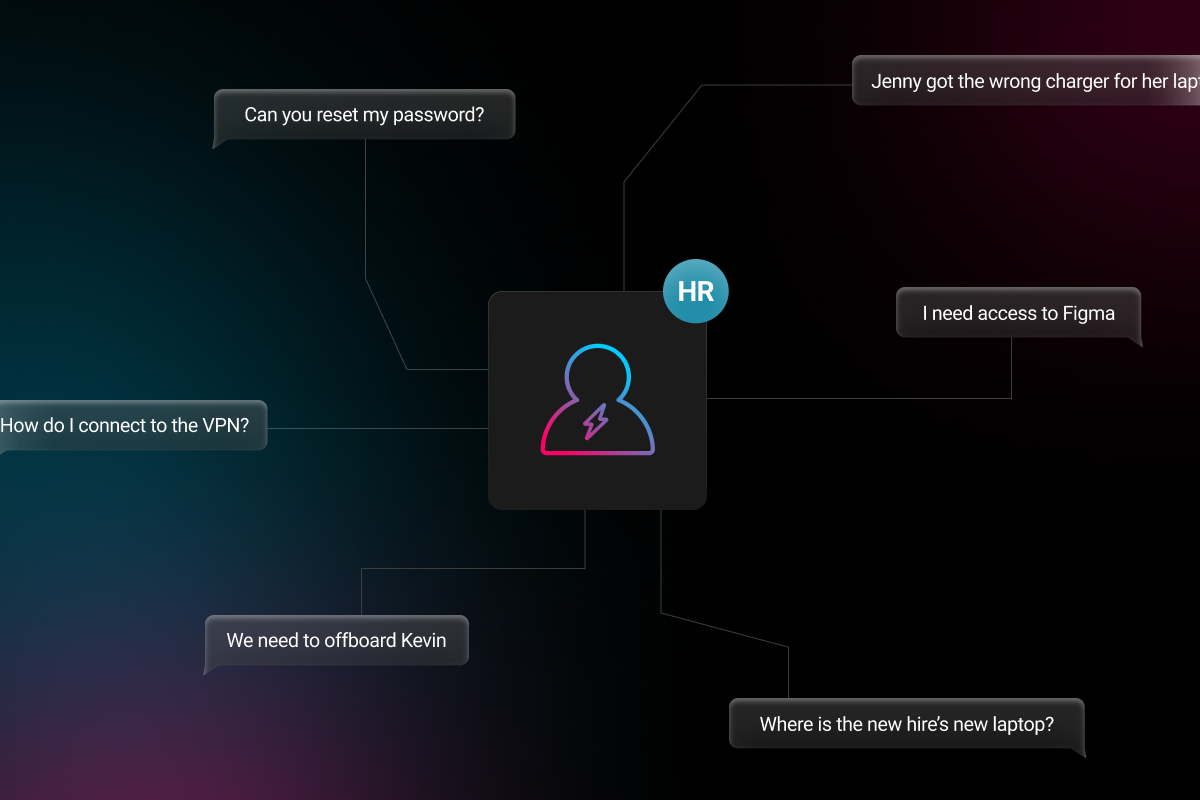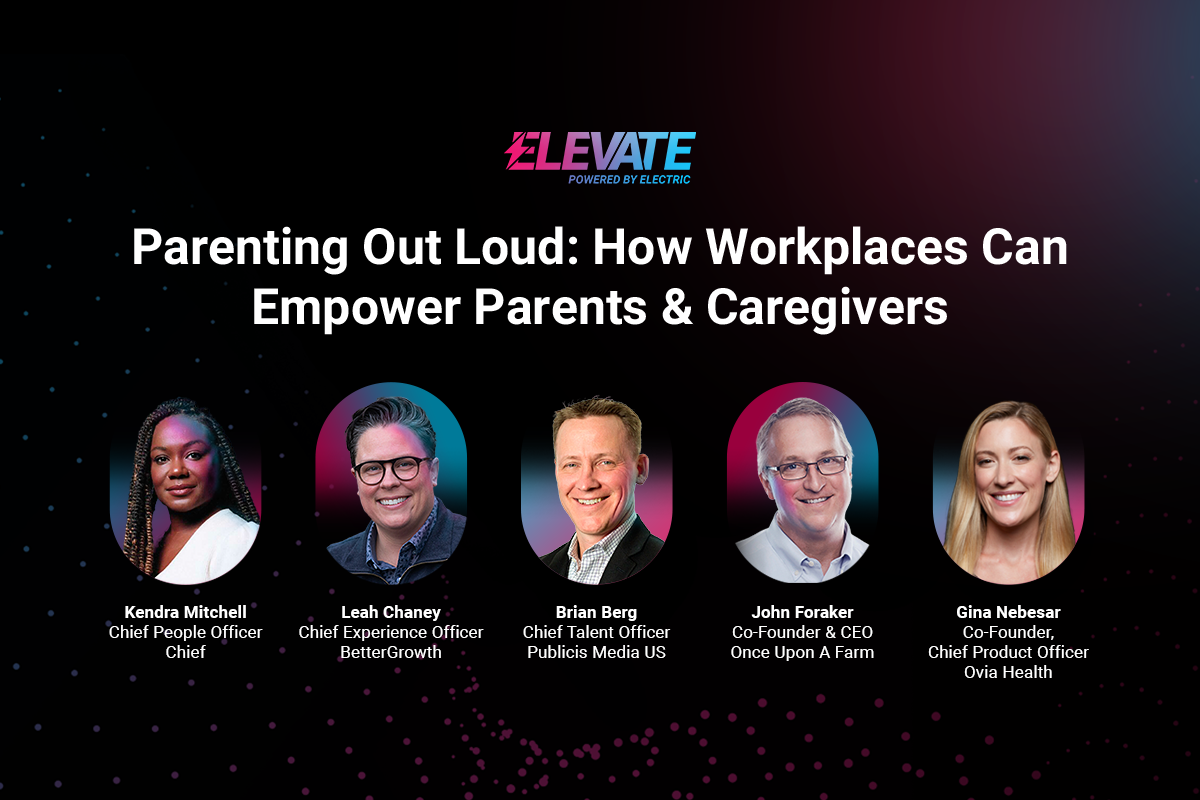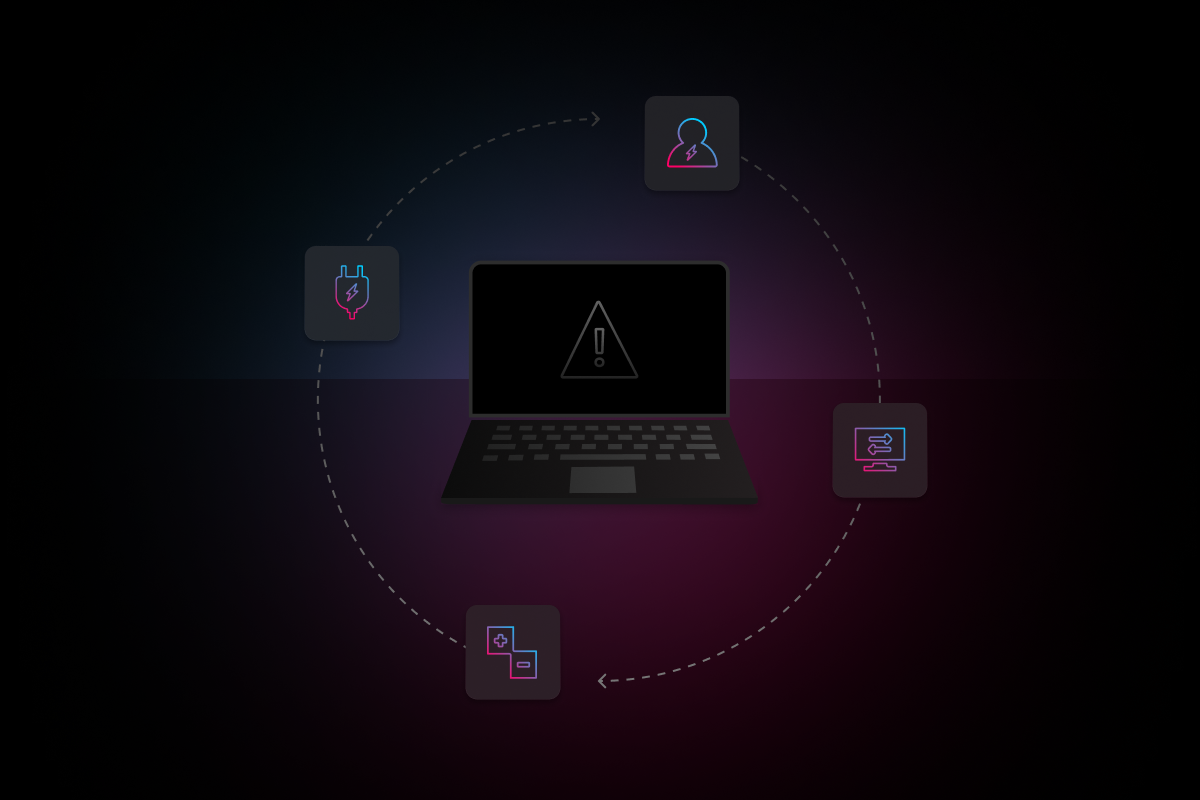
“I often chose jobs based on where I felt included, but I stayed at jobs where I felt like my family mattered.”
Elevate brought together a panel of experts to examine how we can build workplace cultures that empower parents and celebrate caregivers. Moderator Gina Nebesar, Co-Founder of Ovia Health, was joined by the following contributors to share their approaches to parenting out loud:
- Brian Berg, Chief Talent Officer, Publicis Media
- Leah Chaney, Chief Experience Officer, BetterGrowth
- John Foraker, Co-founder & CEO, Once Upon a Farm
- Kendra Mitchell, Chief People Officer, Chief
Keep reading for a recap of their session, or watch the recording here!
What impact has remote work had on workplace culture for parents and caregivers?
John says the abrupt shift to remote work in March 2020 didn’t just prompt the uptake of new technologies and ways of working, it also changed how we interact with our colleagues.
“I don’t think many of us can say we really knew the people we were working with everyday in the office,” he says of pre-pandemic workplace culture. “We didn’t have nearly as much empathy or understanding of what was going on in each of their individual lives with respect to their kids or maybe with sick parents.”
This new insight led John’s organization to a more flexible approach to people management. “As a company that’s really focused on prioritizing kids and family, we talked to our managers and teams about understanding all of those things and letting employees do the work when and how they can.”
“About a year into this experiment, we saw productivity and engagement was really high, and we decided to go all in. Now we’re fully remote, we lifted the barriers on where and how we hire… It’s been game-changing.”
Are remote and hybrid environments inherently more accommodating for parents?
Kendra says remote work presents greater flexibility for parents, but it can also create more stress if boundaries are not put in place. “Hybrid and remote work, when done right, can really empower all employees, including caregivers, to make the choices about where, how, and when they work that are best for them.”
“On the other hand, hybrid and remote work can really blur the lines between work and home, making employees – especially caregivers – feel like they’re never truly off. Their day doesn’t really start at nine and it doesn’t really end at five. We’ve seen that some employees, working caregivers included, really need more help setting boundaries around their work and their life.”
While the benefits of remote work for caregivers are well documented, Kendra says a little guidance goes a long way.
“Part of that is about training managers and partnering with People teams to help support employees, because it’s not a one size fits all solution. What works for one parent or caregiver may not work for another. When you get individualized and personalized to make hybrid work more accommodating and less stressful, it really does become a deeply personal matter.”
What can HR leaders do to foster a more empowering culture for parents?
Leah highlighted the importance of recognizing the concept of family is incredibly vast. “As a queer person, to parent out loud, first you have to feel safe to be out loud. You have to feel safe to be who you are. That’s the angle for the queer community, but that holds for all kinds of cultural diversity.”
From there, you have to focus on inclusivity, which starts with things like gender neutral phrasing. Leah gave the example of ‘maternity leave’ as just one term that can be more inclusive, and should encompass equal leave entitlements for all parents.
“We just assume, even with the best of intentions, that caregivers in a family are the birth mothers. We forget there are humans with a uterus, we forget there are heteronormative families where the father stays at home with the baby. Even the most ‘traditional’ of families still has diverse needs.”
Beyond inclusive language, it’s important to look at benefits. “Basic benefit packages like FMLA limit family qualities and leave. If you don’t have a ‘traditional’ family and someone important passes away, you’re often unpaid for that time. There’s an opportunity for employers to take the norms and make them what is really normalized, which is that it’s not normal to be that black and white with families.”
“From there, you want to make sure your HR staff is trained on the different types of families and the impact of family stigma… One of the most painful things to me is that we use the word ‘perk’ to describe allowing those who have been othered and marginalized to feel included. Part of what we’re trying to change is that it’s not a perk, it’s a basic human right.”
“So parent out loud, but employ out loud… In my personal life, as a queer person, I often chose jobs based on where I felt included, but I stayed at jobs where I felt like my family mattered.”
How can employees better advocate for themselves as caregivers?
Brian highlighted that caregiving responsibilities evolve over our lifetime, and many employees are parenting up as well as down. “I’m in a different phase of parenting that’s helping to care for my mom… That can be a different disruption in my day as I think about how I organize myself, and then I’ve got three kids running around who also want my attention. Organizations have to be prepared for those life changes that employees will go through.”
When it comes to advocating, Brian encourages everyone to share their own stories. “I have a son who is now 21 years old who went through three years of leukemia treatment. He’s doing really well now but my company really rallied behind me [at the time]… Sharing those stories brings authenticity to what we do and that just helps us be better humans.”
He also recommended a strategy of celebrating versus minimizing differences. “Every one of us can play a part in celebrating our differences by bringing our authentic selves to our meetings and to how we introduce ourselves. Parenting is one of those elements where we can all do more.”
What are the positive impacts of a culture that celebrates parenthood?
John says his organization experienced a range of benefits when they expanded family leave. “In 2019, we did a lot of research on paid family leave and recognized how huge of a miss it is in our society that companies don’t really get behind that. We put an 18 week plan in place that’s broadly inclusive for everyone and it’s been unbelievable, not only in terms of retention of great employees, but also attracting people who want to work for a company like that.”
Brian added that companies should do more to highlight these benefits. “Often, employees don’t even realize that you may have amazing benefits to offer them, whether that’s childcare support or benefits around surrogacy, adoption, or fertility support… There’s a lot that we throw at people during open enrollment so celebrate and reinforce those benefits.”
Leah says organizations that celebrate family and diversity also open up their companies to a wider pool of talent. Pre-pandemic, many companies filtered out talent based on location, while many still rule out candidates based on education, years of experience, or even family status. Now, we have an opportunity to flip that stigma into opportunity.
“One of the biggest challenges in diversity and inclusion is we filter out talent. Open up that filter. Diversity and inclusion is organic at that point when you stop eliminating people, and naturally more people stay with your company.”
Kendra added that a focus on parent-empowered cultures also helps to further the wider narrative on human-centric work. “We are all multi-dimensional beings with families that look different, whether it’s caring for parents, young children, or siblings. We’re all multi-dimensional creatures who work, but are humans first. Focusing more on families and building more inclusive practices opens up more space for everybody to show up authentically as themselves.”
Learn More From Elevate 2022
Want to hear more from our speakers at Elevate 2022? The event recordings are now available to watch here, and we’ll bring you more coverage on the Electric blog over the coming weeks!



